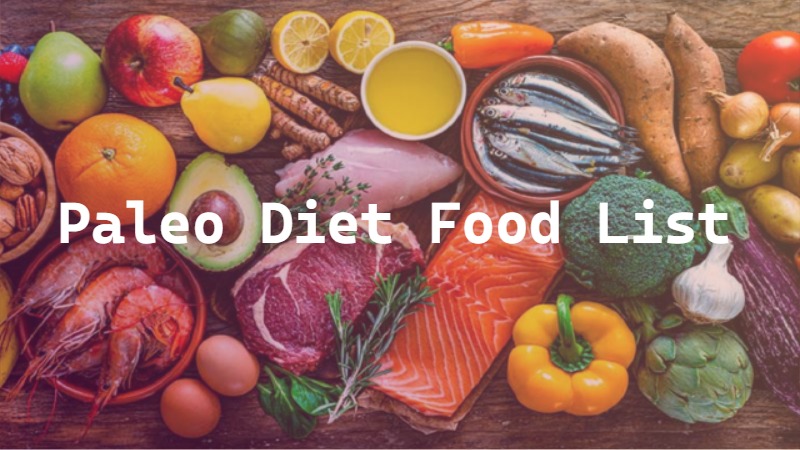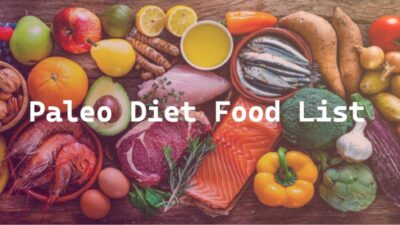
The paleo diet, short for “paleolithic diet,” is a dietary approach that aims to mimic the eating habits of our prehistoric ancestors who lived during the Paleolithic era, a period that ended around 10,000 years ago. Proponents of the paleo diet believe that our modern diet and lifestyle are at odds with our evolutionary heritage, and that by returning to a diet more similar to what our ancestors ate, we can improve our health and well-being. Check the Paleo Diet Food List with names of foods which modern human beings must eat to stay healthy.
The core principle of the paleo diet is to consume whole, unprocessed foods that would have been available to early humans, while avoiding or limiting foods that became more prevalent after the advent of agriculture. This is based on the assumption that our bodies are better adapted to the foods that were consumed during this ancient time.
Paleo Diet Food List
- Meats: Lean meats such as beef, pork, lamb, poultry, and game meats. Preferably from grass-fed or pasture-raised sources.
- Fish and Seafood: Wild-caught fish and seafood are excellent sources of protein and healthy fats.
- Eggs: Eggs from free-range or pasture-raised chickens.
- Vegetables: Non-starchy vegetables like broccoli, spinach, kale, cauliflower, peppers, and more.
- Fruits: Fresh fruits in moderation, such as berries, apples, pears, oranges, and melons.
- Nuts and Seeds: Almonds, walnuts, macadamia nuts, flaxseeds, chia seeds, and others. These should be consumed in moderation due to their calorie content.
- Healthy Fats: Avocado, coconut oil, olive oil, and other natural fats.
- Herbs and Spices: These can be used to add flavor to your dishes.
- Natural Sweeteners: Occasional use of natural sweeteners like honey and maple syrup, although some strict paleo adherents avoid these.
- Herbal Teas: Non-caffeinated teas like herbal and fruit teas.
- Root Vegetables: Sweet potatoes and other root vegetables can be consumed in moderation.
Foods to Avoid on Paleo Diet
- Grains: All grains including wheat, rice, corn, oats, and barley are avoided.
- Legumes: Beans, lentils, peanuts, and soybeans are excluded.
- Dairy: Most dairy products are avoided due to lactose intolerance concerns. Some versions of the paleo diet allow for limited consumption of grass-fed butter and ghee.
- Processed Foods: Processed foods, refined sugars, and artificial additives are generally not part of the paleo diet.
- Refined Oils: Vegetable oils like soybean, corn, and canola oils are often avoided due to their high omega-6 fatty acid content.
- Sugars and Sweets: Most desserts, candies, and sugary snacks are excluded.
- Alcohol: Some versions of the paleo diet discourage alcohol consumption.
Paleo Diet Benefits
- Whole Food Emphasis: The Paleo diet encourages the consumption of whole, nutrient-dense foods such as lean meats, fish, vegetables, fruits, nuts, and seeds. These foods are generally rich in vitamins, minerals, and antioxidants.
- Reduction of Processed Foods: The diet eliminates or greatly reduces the consumption of processed foods, refined sugars, and artificial additives, which are common contributors to obesity and chronic diseases.
- Weight Management: Many people find that the Paleo diet helps them lose weight or maintain a healthy weight due to its focus on protein and fiber-rich foods. Protein can help increase satiety, which may lead to reduced calorie intake.
- Blood Sugar Regulation: By eliminating refined sugars and processed carbohydrates, the Paleo diet may help stabilize blood sugar levels and reduce the risk of type 2 diabetes.
- Improved Digestion: The diet’s emphasis on whole foods, vegetables, and fruits can provide ample dietary fiber, which supports digestive health and regularity.
- Reduced Inflammation: Some proponents of the Paleo diet argue that it may help reduce inflammation in the body due to the avoidance of foods that can trigger inflammation, such as refined sugars and trans fats.
- Higher Nutrient Intake: The diet encourages the consumption of nutrient-dense foods like lean meats and fish, which can provide essential nutrients such as omega-3 fatty acids, iron, and zinc.
- Allergen Avoidance: The Paleo diet excludes common allergens like dairy and grains, which can be beneficial for individuals who are sensitive or allergic to these foods.
- Improved Lipid Profiles: Some studies suggest that the Paleo diet may lead to improvements in lipid profiles, including decreased levels of total cholesterol, LDL cholesterol (the “bad” cholesterol), and triglycerides.
- Personalization: The Paleo diet can be adapted to individual preferences and needs. While the core principles involve avoiding certain food groups, individuals can tailor the diet to suit their specific dietary requirements.
Health Risks Associated With Paleo Diet
While the Paleo diet has been associated with potential benefits, it also carries certain risks and criticisms that individuals should be aware of before considering its adoption:-
About Paleo Diet
The paleo diet, also known as the Paleolithic diet or caveman diet, is based on the idea of eating foods that our ancestors from the Paleolithic era might have consumed. It emphasizes whole, unprocessed foods and eliminates or restricts modern processed foods. Interpretations of the paleo diet can vary, and some individuals might make slight modifications based on their preferences and health goals. While some people follow a strict version of the diet, others might incorporate certain foods that are typically excluded, such as high-quality dairy or limited amounts of grains.
Consider your own nutritional needs first to ensure that it aligns with your nutritional needs and health goals. Paleo diet also has its critics where some concerns include the potential for nutrient deficiencies (such as calcium and vitamin D due to limited dairy consumption), the exclusion of healthy whole grains and legumes and the challenge of adhering to the diet in the long term. As with any diet, it’s recommended to consult with a healthcare professional or registered dietitian before making significant changes to your eating habits, especially if you have underlying health conditions.










